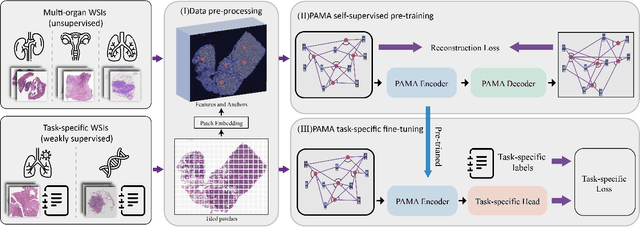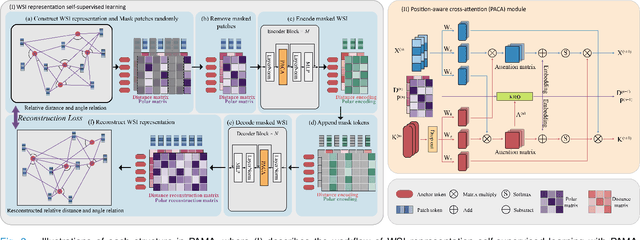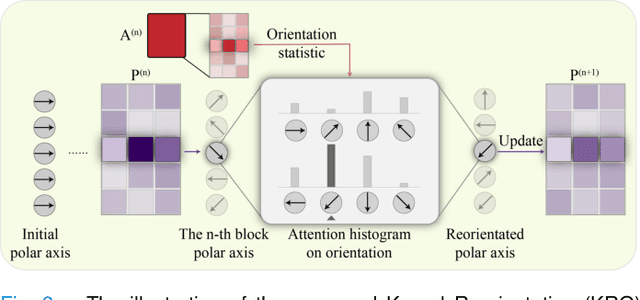Haibo Wu
Promptable Representation Distribution Learning and Data Augmentation for Gigapixel Histopathology WSI Analysis
Dec 19, 2024Abstract:Gigapixel image analysis, particularly for whole slide images (WSIs), often relies on multiple instance learning (MIL). Under the paradigm of MIL, patch image representations are extracted and then fixed during the training of the MIL classifiers for efficiency consideration. However, the invariance of representations makes it difficult to perform data augmentation for WSI-level model training, which significantly limits the performance of the downstream WSI analysis. The current data augmentation methods for gigapixel images either introduce additional computational costs or result in a loss of semantic information, which is hard to meet the requirements for efficiency and stability needed for WSI model training. In this paper, we propose a Promptable Representation Distribution Learning framework (PRDL) for both patch-level representation learning and WSI-level data augmentation. Meanwhile, we explore the use of prompts to guide data augmentation in feature space, which achieves promptable data augmentation for training robust WSI-level models. The experimental results have demonstrated that the proposed method stably outperforms state-of-the-art methods.
Slide-based Graph Collaborative Training for Histopathology Whole Slide Image Analysis
Oct 14, 2024Abstract:The development of computational pathology lies in the consensus that pathological characteristics of tumors are significant guidance for cancer diagnostics. Most existing research focuses on the inner-contextual information within each WSI yet ignores the possible inter-correlations between slides. As the development of tumors is a continuous process involving a series of histological, morphological, and genetic changes that accumulate over time, the similarities and differences between WSIs across various stages, grades, locations and patients should potentially contribute to the representation of WSIs and deserve to be taken into account in WSI modeling. To verify the advancement of introducing the slide inter-correlations into the representation learning of WSIs, we proposed a generic WSI analysis pipeline SlideGCD that can be adapted to any existing Multiple Instance Learning (MIL) frameworks and improve their performance. With the new paradigm, the prior knowledge of cancer development can participate in the end-to-end workflow, which concurrently initializes and refines the slide representation, as a guide for message passing in the slide-based graph. Extensive comparisons and experiments are conducted to validate the effectiveness and robustness of the proposed pipeline across 4 different tasks, including cancer subtyping, cancer staging, survival prediction, and gene mutation prediction, with 7 representative SOTA WSI analysis frameworks as backbones.
Pan-cancer Histopathology WSI Pre-training with Position-aware Masked Autoencoder
Jul 10, 2024



Abstract:Large-scale pre-training models have promoted the development of histopathology image analysis. However, existing self-supervised methods for histopathology images focus on learning patch features, while there is still a lack of available pre-training models for WSI-level feature learning. In this paper, we propose a novel self-supervised learning framework for pan-cancer WSI-level representation pre-training with the designed position-aware masked autoencoder (PAMA). Meanwhile, we propose the position-aware cross-attention (PACA) module with a kernel reorientation (KRO) strategy and an anchor dropout (AD) mechanism. The KRO strategy can capture the complete semantic structure and eliminate ambiguity in WSIs, and the AD contributes to enhancing the robustness and generalization of the model. We evaluated our method on 6 large-scale datasets from multiple organs for pan-cancer classification tasks. The results have demonstrated the effectiveness of PAMA in generalized and discriminative WSI representation learning and pan-cancer WSI pre-training. The proposed method was also compared with \R{7} WSI analysis methods. The experimental results have indicated that our proposed PAMA is superior to the state-of-the-art methods.The code and checkpoints are available at https://github.com/WkEEn/PAMA.
Multi-Microgrid Collaborative Optimization Scheduling Using an Improved Multi-Agent Soft Actor-Critic Algorithm
Apr 01, 2023



Abstract:The implementation of a multi-microgrid (MMG) system with multiple renewable energy sources enables the facilitation of electricity trading. To tackle the energy management problem of a MMG system, which consists of multiple renewable energy microgrids belonging to different operating entities, this paper proposes a MMG collaborative optimization scheduling model based on a multi-agent centralized training distributed execution framework. To enhance the generalization ability of dealing with various uncertainties, we also propose an improved multi-agent soft actor-critic (MASAC) algorithm, which facilitates en-ergy transactions between multi-agents in MMG, and employs automated machine learning (AutoML) to optimize the MASAC hyperparameters to further improve the generalization of deep reinforcement learning (DRL). The test results demonstrate that the proposed method successfully achieves power complementarity between different entities, and reduces the MMG system operating cost. Additionally, the proposal significantly outperforms other state-of-the-art reinforcement learning algorithms with better economy and higher calculation efficiency.
 Add to Chrome
Add to Chrome Add to Firefox
Add to Firefox Add to Edge
Add to Edge